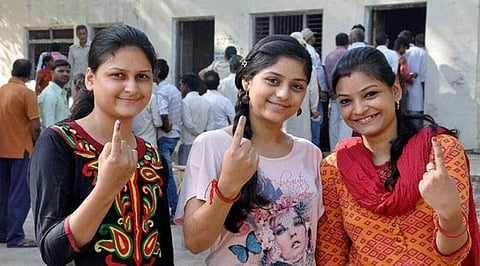

KOCHI: Various theories are being floated on the determining factor of the elections in Kerala.
What’s interesting is that a large number of women voters, who ventured out to poll - sometimes even staying back for even seven hours to cast their franchise - will be the deciding factor. Though the higher women turnout has led to a theory that Sabarimala issue may be the reason for the increased numbers, a close analysis of the numbers shows no clear signals. In fact, there are chances the rise may be due to other reasons, including consolidation of Muslim votes.
In Idukki and Kottayam, men outnumber women
Consider this: The top constituencies where women polled outnumbered men in a big way are Vadakara (89,546), Ponnani (83,416), Attingal (81,550) and Kasargod (81,281) - all of them have significantly higher Muslim votes. In Kasargod, however, Hindu votes and the Sabarimala factor are also determining factors, said political analysts.
On the other hand, constituencies where the BJP is capitalising on the Sabarimala issue, viz., T’puram (23,284) and Pathanamthitta (40,892), did not see huge margin in favour of women votes polled. An exception to this is only Thrissur where 62,954 women polled more than men, perhaps some reason for the BJP camp to cheer about.
An analysis of the data shows there was an increase in both male and women votes polled in 2019 compared to 2014, but the rise was higher in women voters. While the voting by men rose from 73.95 per cent in 2014 to 76.48 per cent in 2019, the women votes polled increased from 73.85 per cent in 2014 to 78.80 per cent in 2019 - a clear difference of 2.32 percentage points in favour of women. During 2014, in percentage terms, men polled more than women in the state, a trend which was turned in favour of women in 2019.
“Based on these numbers, it’s very difficult to connect to the Sabarimala issue. But, if you look at the constituencies where women voted in large numbers, viz., Ponnani, Vadakara, Kasargod and even Attingal, the common thread is that these places have a large concentration of Muslim population. So, it could be that there is a consolidation of minority votes who may be voting against the Modi Government’s anti-Muslim stand. This could be one interpretation,’’ said K N Harilal, professor, Centre for Development Studies, Thiruvananthapuram.
CMP leader C P John, however, said the constituencies where women outnumbered men in votes polled are areas where a large number of men are working outside the state, mostly in the Gulf region. “While the men have not returned to cast their votes, the women who had stayed back in their homes last time, have ventured out to vote,” he said.
The view was echoed by Sebastian Paul, a former legislator. “Constituencies like Ponnani and Vadakara are areas where a large number of people are working abroad. So, this could be the reason for the higher number of women votes polled,” Sebastian Paul said.
Only in Idukki (-14,478) and Kottayam (-5771), out of the 20 constituencies, women went behind men in the total number of votes polled. C P John attributes this to migration. “In both Idukki and Kottayam, the migration is by women, most of whom are working as nurses abroad,” he said.